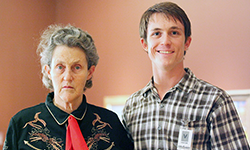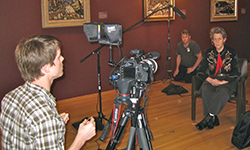4 Reflections on Life & Happiness From an Interview with Dr. Temple Grandin
a Cinema Touching Disability postscript
Guest blogger: Alex Murphy
 |
When William Greer and Dennis Borel of CTD approached me about collaborating to film and edit a documentary interview with Temple Grandin, I didn’t know much about her. Yet after extensive research and watching the HBO movie about her life, I immediately found myself moved by her unique genius and determination. I felt honored to be involved with the project.
After meeting Temple and editing this film, I gained even more respect for her skill as an industrial designer, her deep understanding of Autism and her unique way of seeing the world. Here are four themes (among many) from her interview that spoke to me as near-universal truths about life, passion, and happiness. View the full interview below.
1. We Need All Kinds of Minds
There are distinctly different types of thinkers in our world: visual/photorealistic (like Temple), pattern/mathematical, verbal and auditory. Therefore, finding ways to nurture creative collaboration between different thinkers is crucial in education, business and family connections. We should not try to make everyone fit into the same box.
In the interview, Temple uses the example of the original iPhone. Steve Jobs, who would probably be labeled autistic today, was an artistic visual thinker who designed the user interface. Meanwhile, the mathematical engineers made the physical technology of the phone work. Both kinds of minds were crucial to the project’s success: Design + Engineering!
2. Find A Career In Your Passion
Temple stresses the importance of encouraging the passions and special interests of Autistic children, then figuring out how to turn those passions into careers. This is a truism for all kids, and we should foster an environment where they can dream big and follow their aspirations. While money is important, it’s living a life of passion (and compassion) that’s going to inspire them to do great things.
3. Live a Life WIthout Labels
It bothers Temple when she’s approached by a “smart, geeky 9 year old and all they want to talk about is Autism, rather than their science or art project.” Letting any label, good or bad, completely define you severely limits your potential for growth and happiness.
I began to stutter in the seventh grade. Up through high school, I felt physically and emotionally trapped by the stressful feelings associated with my speech impediment. Only after receiving therapy to lessen my fear and anxiety was I able to embrace stuttering as part of who I am, rather than a negative force I had to struggle to overcome. This is perfectly aligned with Temple’s message.
4. Stretch Beyond Your Comfort Zone
Temple speaks passionately about the need to gently stretch Autistic kids beyond their emotional, social and parental limits, while also not “chucking them in the deep end of the pool” either. Growing up learning proper social skills and developing the discipline of work are crucial. It will help lead to an independent, successful life.
Comfort zones also apply to parents as well. A mother we interviewed after Temple’s speech mentioned her own fears about seeing her daughter with Autism off to college, joking that “she’s more ready to go than I am!” However, the mom also realized that her dreams to be an artist are “just as real” as those of her other daughter, who is attending medical school. She supports both her children 100%.
As Temple’s high school science teacher, Dr. Carlock, said to inspire her in the HBO movie: "Think of every challenge as a door. There’s a whole new world on the other side. All you have to do is open it!"
---
I heartily thank the Coalition of Texans with Disabilities, Dennis Borel, William Greer, and Temple Grandin for the opportunity to work on this project. If you enjoyed this film, please view my documentary about stuttering, Let Me Finish.
 |
About the Author:
Alex R Murphy is a filmmaker, writer and editor in Austin TX. He’s founder and creative director at Golden Arm Video Productions, a creative multimedia company that creates promotional video content and documentary films for businesses and nonprofits. You can find him on Twitter and Google+.
Alex has collaborated with the Coalition of Texans with Disabilities (CTD) on multiple projects, most recently on our documentary film “The Autistic Brain: An Interview with Dr. Temple Grandin.” The film opened the tenth annual Cinema Touching Disability Film Festival November 1 & 2, 2013 in Austin Texas.
---


